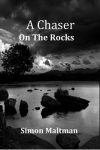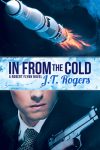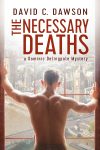October 31 – November 6: “Is tone linked more to the author’s or the character’s attitude?”
 We have a full house this week, with ITW Members Hank Phillippi Ryan, Mona Karel, Simon Maltman, Jean Rabe, Vicki Delany, Anna J. Stewart, David Mannes, Carole Nelson Douglas, J. T. Rogers, Neil Plakcy, A. J. Kerns and David C. Dawson all discussing tone. Is tone linked more to the author’s or the character’s attitude?
We have a full house this week, with ITW Members Hank Phillippi Ryan, Mona Karel, Simon Maltman, Jean Rabe, Vicki Delany, Anna J. Stewart, David Mannes, Carole Nelson Douglas, J. T. Rogers, Neil Plakcy, A. J. Kerns and David C. Dawson all discussing tone. Is tone linked more to the author’s or the character’s attitude?
~~~~~
 Arthur Kerns is a retired FBI supervisory special agent and past president of the Arizona chapter of the Association of Former Intelligence Officers (AFIO). His award-winning short fiction has appeared in numerous anthologies. He is a book reviewer for the Washington Independent Review of Books. Diversion Books, Inc. NY, NY published his espionage thriller, The Riviera Contract, and the sequel, The African Contract. The third in the series, The Yemen Contract, was released in June 2016.
Arthur Kerns is a retired FBI supervisory special agent and past president of the Arizona chapter of the Association of Former Intelligence Officers (AFIO). His award-winning short fiction has appeared in numerous anthologies. He is a book reviewer for the Washington Independent Review of Books. Diversion Books, Inc. NY, NY published his espionage thriller, The Riviera Contract, and the sequel, The African Contract. The third in the series, The Yemen Contract, was released in June 2016.
 Hank Phillippi Ryan is the on-air investigative reporter for Boston’s NBC affiliate. She’s won 33 EMMYs, 14 Edward R. Murrow awards and dozens of other honors for her groundbreaking journalism. A bestselling author of nine mystery novels, Ryan has won multiple prestigious awards for her crime fiction: five Agathas, two Anthonys, the Daphne, two Macavitys, and for THE OTHER WOMAN, the coveted Mary Higgins Clark Award.
Hank Phillippi Ryan is the on-air investigative reporter for Boston’s NBC affiliate. She’s won 33 EMMYs, 14 Edward R. Murrow awards and dozens of other honors for her groundbreaking journalism. A bestselling author of nine mystery novels, Ryan has won multiple prestigious awards for her crime fiction: five Agathas, two Anthonys, the Daphne, two Macavitys, and for THE OTHER WOMAN, the coveted Mary Higgins Clark Award.
 Mona Karel is the writing alter ego of Monica Stoner, who wrote Beatles fan fiction and terribly earnest (read just not very good) Gothics in her teen years. She set aside writing while working with horses and dogs all over the US, until she discovered used book stores and Silhouette Romances. Shortly after that she also discovered jobs that paid her for more than her ability to do a good scissors finish on a terrier, and moved into the “real” working world. Right around then she wrote her first full length book. It only took her twenty seven years after that to be published, and not that book!
Mona Karel is the writing alter ego of Monica Stoner, who wrote Beatles fan fiction and terribly earnest (read just not very good) Gothics in her teen years. She set aside writing while working with horses and dogs all over the US, until she discovered used book stores and Silhouette Romances. Shortly after that she also discovered jobs that paid her for more than her ability to do a good scissors finish on a terrier, and moved into the “real” working world. Right around then she wrote her first full length book. It only took her twenty seven years after that to be published, and not that book!
 Simon Maltman is a writer and musician from Northern Ireland. This is his debut novel after previously having crime fiction short stories featured in a number of magazines and anthologies. He has also had poetry and articles published in a range of magazines. Simon has self-published a number of crime fiction e-books over the last year. There is work underway for further crime fiction releases in the near future.
Simon Maltman is a writer and musician from Northern Ireland. This is his debut novel after previously having crime fiction short stories featured in a number of magazines and anthologies. He has also had poetry and articles published in a range of magazines. Simon has self-published a number of crime fiction e-books over the last year. There is work underway for further crime fiction releases in the near future.
 Jean Rabe is the author of 35 fantasy, science fiction, and adventure novels, and more short stories than she cares to count. She is the assistant editor of Galaxy’s Edge Magazine and edits novels in her spare time. When not working, Jean tosses tennis balls to her cadre of dogs, plays boardgames and role-playing games, and fuses glass. She lives in Central Illinois, surrounded by farmland and railroad tracks.
Jean Rabe is the author of 35 fantasy, science fiction, and adventure novels, and more short stories than she cares to count. She is the assistant editor of Galaxy’s Edge Magazine and edits novels in her spare time. When not working, Jean tosses tennis balls to her cadre of dogs, plays boardgames and role-playing games, and fuses glass. She lives in Central Illinois, surrounded by farmland and railroad tracks.
 Vicki Delany is one of Canada’s most prolific and varied crime writers, author of more than twenty published crime novels, including standalone Gothic thrillers, and the Constable Molly Smith series from Poisoned Pen Press and the Year Round Christmas Mysteries from Penguin Random House. Under the pen name of Eva Gates she is the national bestselling author of the Lighthouse Library cozy series from Penguin Random House, set in a historic lighthouse on the Outer Banks of North Carolina. Vicki lives in Prince Edward County, Ontario. She is the current president of the Crime Writers of Canada.
Vicki Delany is one of Canada’s most prolific and varied crime writers, author of more than twenty published crime novels, including standalone Gothic thrillers, and the Constable Molly Smith series from Poisoned Pen Press and the Year Round Christmas Mysteries from Penguin Random House. Under the pen name of Eva Gates she is the national bestselling author of the Lighthouse Library cozy series from Penguin Random House, set in a historic lighthouse on the Outer Banks of North Carolina. Vicki lives in Prince Edward County, Ontario. She is the current president of the Crime Writers of Canada.
 USA Today and national bestselling author Anna J. Stewart can’t remember a time she didn’t have a book in her hands or a story in her head. A geek at heart, Anna writes romances featuring strong, independent heroines. RT Book reviews says Anna’s romances are “refreshingly unique, quietly humorous, and profoundly moving” and NYTimes bestselling author Brenda Novak says “The talented Anna J Stewart delivers every time!” Anna lives in Northern California where she deals with a serious SUPERNATURAL, STAR TREK, and SHERLOCK addiction and tolerates an overly affectionate cat named Snickers (or perhaps it’s Snickers who tolerates her). When she’s not writing, you can usually find her at fan conventions or at her local movie theater.
USA Today and national bestselling author Anna J. Stewart can’t remember a time she didn’t have a book in her hands or a story in her head. A geek at heart, Anna writes romances featuring strong, independent heroines. RT Book reviews says Anna’s romances are “refreshingly unique, quietly humorous, and profoundly moving” and NYTimes bestselling author Brenda Novak says “The talented Anna J Stewart delivers every time!” Anna lives in Northern California where she deals with a serious SUPERNATURAL, STAR TREK, and SHERLOCK addiction and tolerates an overly affectionate cat named Snickers (or perhaps it’s Snickers who tolerates her). When she’s not writing, you can usually find her at fan conventions or at her local movie theater.
 David M. Mannes is a Cantor-Educator and a member of the American Conference of Cantors. He has served congregations in the United States and Canada. He is also former educational film producer/director and scriptwriter. He was nominated in 1990 for best non-dramatic script in the Alberta Motion Picture Industry Association (A.M.P.I.A.) awards for “Writing-on-Stone” featuring actor Leslie Neilson which he co-produced for Alberta Parks. David is the author of The Reptilian Encounter, Scarlet Justice, and Creature Feature among others. His new humorous coming-of-age novel, The Cantor’s Son, will be published in 2016. He has had a long time interest in UFOs, paranormal and unexplained phenomena, as well as, history. David is also a member of the Writer’s Guild of Alberta. David Mannes is married and lives in Edmonton, Alberta, Canada.
David M. Mannes is a Cantor-Educator and a member of the American Conference of Cantors. He has served congregations in the United States and Canada. He is also former educational film producer/director and scriptwriter. He was nominated in 1990 for best non-dramatic script in the Alberta Motion Picture Industry Association (A.M.P.I.A.) awards for “Writing-on-Stone” featuring actor Leslie Neilson which he co-produced for Alberta Parks. David is the author of The Reptilian Encounter, Scarlet Justice, and Creature Feature among others. His new humorous coming-of-age novel, The Cantor’s Son, will be published in 2016. He has had a long time interest in UFOs, paranormal and unexplained phenomena, as well as, history. David is also a member of the Writer’s Guild of Alberta. David Mannes is married and lives in Edmonton, Alberta, Canada.
 Carole Nelson Douglas says if she has a literary muse, it’s definitely feline: mysterious, wise, playful, and packing sharp shivs in velvet gloves. An award-winning ex-journalist and USA TODAY best-selling novelist, Carole has written sixty-three novels ranging from historical and contemporary mystery and romance to science fiction thrillers to high and urban fantasy. She’s a four-time Rita Award finalist and has RT Reviews magazine Career Achievement awards in Suspense, Mystery, Versatility and as a Pioneer of Publishing. Currently, she writes the popular Las Vegas-set Midnight Louie, feline PI, mysteries partially narrated by a “Sam Spade with hairballs”. She’s also written the Delilah Street, Paranormal Investigator, noir urban fantasies about werewolf mobsters and Silver Screen zombies in a paranormal Sin City.
Carole Nelson Douglas says if she has a literary muse, it’s definitely feline: mysterious, wise, playful, and packing sharp shivs in velvet gloves. An award-winning ex-journalist and USA TODAY best-selling novelist, Carole has written sixty-three novels ranging from historical and contemporary mystery and romance to science fiction thrillers to high and urban fantasy. She’s a four-time Rita Award finalist and has RT Reviews magazine Career Achievement awards in Suspense, Mystery, Versatility and as a Pioneer of Publishing. Currently, she writes the popular Las Vegas-set Midnight Louie, feline PI, mysteries partially narrated by a “Sam Spade with hairballs”. She’s also written the Delilah Street, Paranormal Investigator, noir urban fantasies about werewolf mobsters and Silver Screen zombies in a paranormal Sin City.
 J.T. Rogers grew up wanting to be either a superhero or a spy—but rather than pick one over the other, she chose to become a writer instead so she could be both in her spare time. Her fiction reflects her childhood obsessions, blending together the distrustful, cloak-and-dagger world of spies with the high-octane action and camaraderie of her favorite superheroes. The product of a bilingual education and an alumna of a handful of universities, J.T.’s passions include history, comic books, and Shakespeare. She has lived all over North America and loves to weave threads of authentic local color into her stories. Just ask her about Lucy the Elephant.
J.T. Rogers grew up wanting to be either a superhero or a spy—but rather than pick one over the other, she chose to become a writer instead so she could be both in her spare time. Her fiction reflects her childhood obsessions, blending together the distrustful, cloak-and-dagger world of spies with the high-octane action and camaraderie of her favorite superheroes. The product of a bilingual education and an alumna of a handful of universities, J.T.’s passions include history, comic books, and Shakespeare. She has lived all over North America and loves to weave threads of authentic local color into her stories. Just ask her about Lucy the Elephant.
 Neil Plakcy has written or edited over three dozen novels and short stories in mystery, romance and erotica. To research The Next One Will Kill You, he participated in the FBI’s sixteen-week citizen’s academy, practiced at a shooting range, and visited numerous gay bars in Fort Lauderdale. (Seriously, it was research.) He is an assistant professor of English at Broward College in South Florida, and has been a construction manager, a computer game producer, and a web developer – all experiences he uses in his fiction.
Neil Plakcy has written or edited over three dozen novels and short stories in mystery, romance and erotica. To research The Next One Will Kill You, he participated in the FBI’s sixteen-week citizen’s academy, practiced at a shooting range, and visited numerous gay bars in Fort Lauderdale. (Seriously, it was research.) He is an assistant professor of English at Broward College in South Florida, and has been a construction manager, a computer game producer, and a web developer – all experiences he uses in his fiction.
 David C. Dawson is an author, award-winning journalist, and documentary maker living near Oxford in the UK. He has traveled extensively, filming in nearly every continent of the world. He has lived in London, Geneva, and San Francisco, but now prefers the tranquility of the Oxfordshire countryside. David is a Mathematics graduate from Southampton University in England. After graduating, he joined the BBC in London as a trainee journalist. He worked in radio newsrooms for several years before moving to television as a documentary director. After more than twenty years with the BBC, he left to go freelance. He has produced videos for several charities, including Ethiopiaid, which works to end poverty in Ethiopia, and Hestia, a London-based mental health charity.
David C. Dawson is an author, award-winning journalist, and documentary maker living near Oxford in the UK. He has traveled extensively, filming in nearly every continent of the world. He has lived in London, Geneva, and San Francisco, but now prefers the tranquility of the Oxfordshire countryside. David is a Mathematics graduate from Southampton University in England. After graduating, he joined the BBC in London as a trainee journalist. He worked in radio newsrooms for several years before moving to television as a documentary director. After more than twenty years with the BBC, he left to go freelance. He has produced videos for several charities, including Ethiopiaid, which works to end poverty in Ethiopia, and Hestia, a London-based mental health charity.
- LAST GIRL MISSING with K.L. Murphy - July 25, 2024
- CHILD OF DUST with Yigal Zur - July 25, 2024
- THE RAVENWOOD CONSPIRACY with Michael Siverling - July 19, 2024
